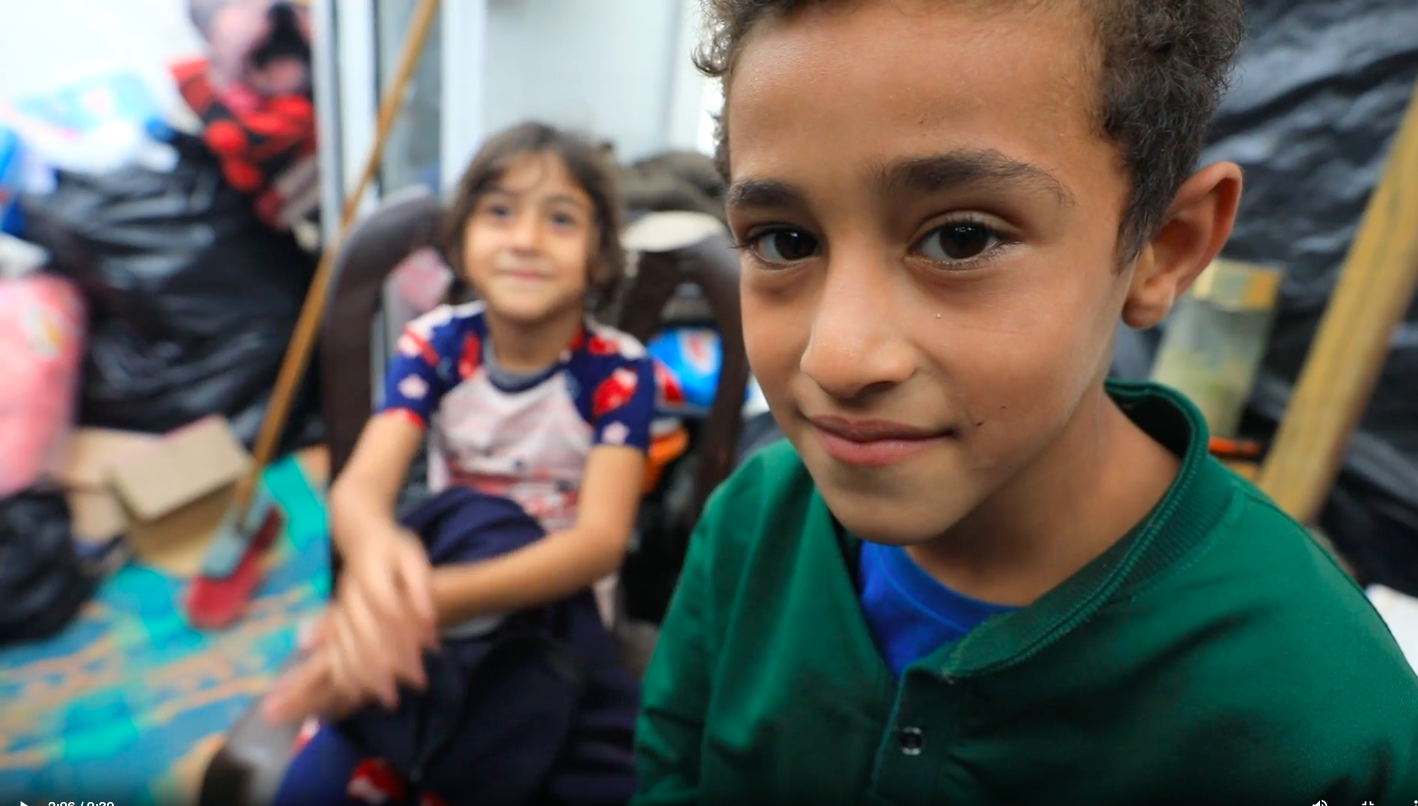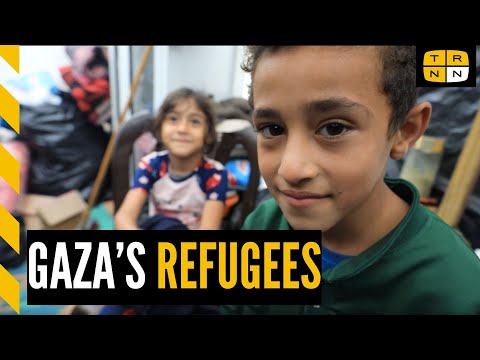Over 1.9 million residents of Gaza have been forced to flee their homes since the start of Israel’s relentless bombing campaign over two months ago. In the south of the Gaza Strip, the city of Khan Yunis, or Khan Younis, has become a temporary destination for the millions seeking safety from the bombing. Yet Khan Yunis is no refuge. Makeshift refugee camps without electricity or water now serve as holding pens for countless families on the brink. The trickle of aid that makes it through the blockade of Gaza is totally insufficient to meet the people’s needs. As stockpiles dwindle and prices soar, the problem only intensifies. Gaza’s displaced may have survived the bombing up until now—but now they must survive hunger, thirst, and disease, all while the war extends into Khan Yunis itself. The Real News reports from Khan Yunis.
Producer: Belal Awad, Leo Erhardt
Videographer: Ruwaida Amer
Video Editor: Leo Erhardt
Transcript
Narrator:
Since early October, Israeli bombs have been raining down on Gaza, causing apocalyptic devastation and the deaths of over 20,000 Palestinians and counting. Many hundreds of thousands more have been displaced, with an estimated 1 million people homeless
and without stable shelter. Whilst nowhere in Gaza is safe, many residents fled the North
to the southern area of Khan Yunis, where bombing and fighting is less intense. Here, make-shift refugee camps have sprung up, becoming temporary refuge for hundreds of thousands. Randa Hammoudeh left her home in the Jabalia district early on in the war.
Randa Hammoudeh
We came here to the Sina’a area, this was around 50 days ago, there were no tents. We stayed one night and two days exactly in the heat and the sun where our faces got burnt.
My face is two colors, as you can see. This was from around 50 days ago. We had no blankets, we had no covers, no sheets – nothing at all. We came with what we had, light things for the summer. We slept, and after much suffering they gave us this tent, after two days of being exposed. I have 6 daughters, they’re young at university, you can imagine the situation. The bathrooms are far away, you need around 10 minutes to get to them. You have to wait your turn. I swear it takes 2 hours to get into the bathroom. Of course they’re not clean. Often you arrive and find that the water is cut off. There’s no water, no hygiene. Honestly, if you were not desperate you would not go in.
Narrator:
Nearly 50% of Gaza’s residents are children. This is Taysir Ali Dibba, his harrowing story of survival is common in the displaced camps of Khan Yunis.
Taysir Ali Dibba:
We got trapped in the school, we were trapped for 6 days. We were waiting for two days
just to drink water. We found it where? In the supermarket, we entered it. We entered the supermarket and after an hour and a half there was shooting. One guy was shot in his shoulder. My relatives stayed in the center of the supermarket. I took off my shirt, and we made a small flag, and we managed to take everyone out. The next day on Friday, we needed water. We told the soldiers that we needed water, they didn’t even respond to us
or even acknowledge us. I found my sister had gone up to the bathroom upstairs.
They shot her where? In her chest. She died. As I was trying to get to her, they shot at me, one bullet grazed my stomach here and a second bullet hit my wrist: it went in here, and came out here. We buried her, we buried her that evening. We buried her next to the school. Not just her, we found dead bodies in the streets, they shot them, we brought them in and buried them.
Narrator:
Despite experiences like this being a dime a dozen, for displaced people there is no time to process or recover, instead people are busy with the urgent task of staying alive.
In order to do this, water is crucial: in the rare points where water is available, people have to queue in line, then carry water back often across long distances and manually.
Man:
I’ve been here since dawn, I prayed and came. We’re here to fill water. It’s coming out at a drip, they haven’t opened it fully. If it was coming out normally, we would have finished and gone by now.
Randa Hammoudeh:
What can I say? Our life is covered in sand. However much you clean you find sand everywhere, in summer or in winter. No matter how much we clean the barrels to fill them with clean water, there’s no use. Diarrhea, flu, cough, bowel movements: we all got it: old and young. Clean water wasn’t available, we were drinking from the well which was not good for drinking but we didn’t find anything else.
Narrator:
The World Health Organisation has warned that more people could yet die from disease in Gaza than from bombings and invasion, indicating that the worst could yet be ahead. Malnutrition, disease, unclean water and harsh weather all represent a looming threat to the displaced. Yusuf Hammoudeh is another displaced resident of Khan Yunis.
Yusuf Hammoudeh:
There’s nowhere to hide from the rain apart from the tent. It’s possible that a gust of wind might take the tent or it might collapse. The last time it rained: me and my children tried to secure the tent, the wind was pulling it too and we got completely drenched trying to make sure it won’t fly away. It was honestly very hard. You need a peg, a clip, some wire, some string, some rope, to hold the tent – you won’t find it. Life here, it’s like we have returned to the Stone Age. We are living in the Stone Age. We don’t know how things are going to go.
Narrator:
Itaf Qays Abu Abdou, is old enough to remember the multiple previous wars on Gaza, but she says that this time, it’s different.
Itaf Qays Abu Abdou:
In 2014, I didn’t leave my house. I have never seen a war like this war. At all. It’s really hard for us, with water, with food and drink there’s no electricity there’s no light for us we stay in the dark until the morning.
You can see life is hard, the circumstances are hard, they gave us cleaning materials only once and we need to bring the water by hand. And we can’t, I am not well, I have a disability from the previous war, what are we supposed to do? We go to the bathrooms and there you
have to wait in line. And you can’t find a drop of water and there’s no electricity, it keeps cutting off. We don’t have anything.
Narrator:
Despite the simplest of food stuffs like oil, flour and rice becoming more and more scarce, local citizens, like shop owner Jamil Abu Asiy, are taking matters into their own hands.
Jamil Abu Asiy:
Before there were NGOs cooking, now there aren’t. So I started to cook a part for sale and the other part for the displaced – of course from the north. Our goal of this project cooking on fires is to safeguard food of the displaced people and to safeguard food for people. We used to be 4 people cooking, but now we are just one. The other guy spends dawn till dusk trying to secure either rice or oil. This used to be worth 16 or 15 shekels ($4 USD), now it’s 30 shekels ($8 USD) and it’s not available. This wood used to cost 1 shekel ($0.30 USD) now it costs 3 shekels ($1 USD) and it’s not available. However, we will continue and god willing we will not stop until we breathe our last breath, God willing.
Narrator:
In the face of all these hardships, Palestinians seem not only to survive, but to thrive… holding firm in the face of adversity and often with good humor.
Woman:
Until when are we gonna be stuck with the dough?!
Until when are we gonna be stuck in the tent? Until when?
They are outside chatting, while we’re stuck in the tent! We are powerful women, we are steadfast women.
We thank God in all situations.
Hopefully, with God’s grace, the war will end for good. God willing.




